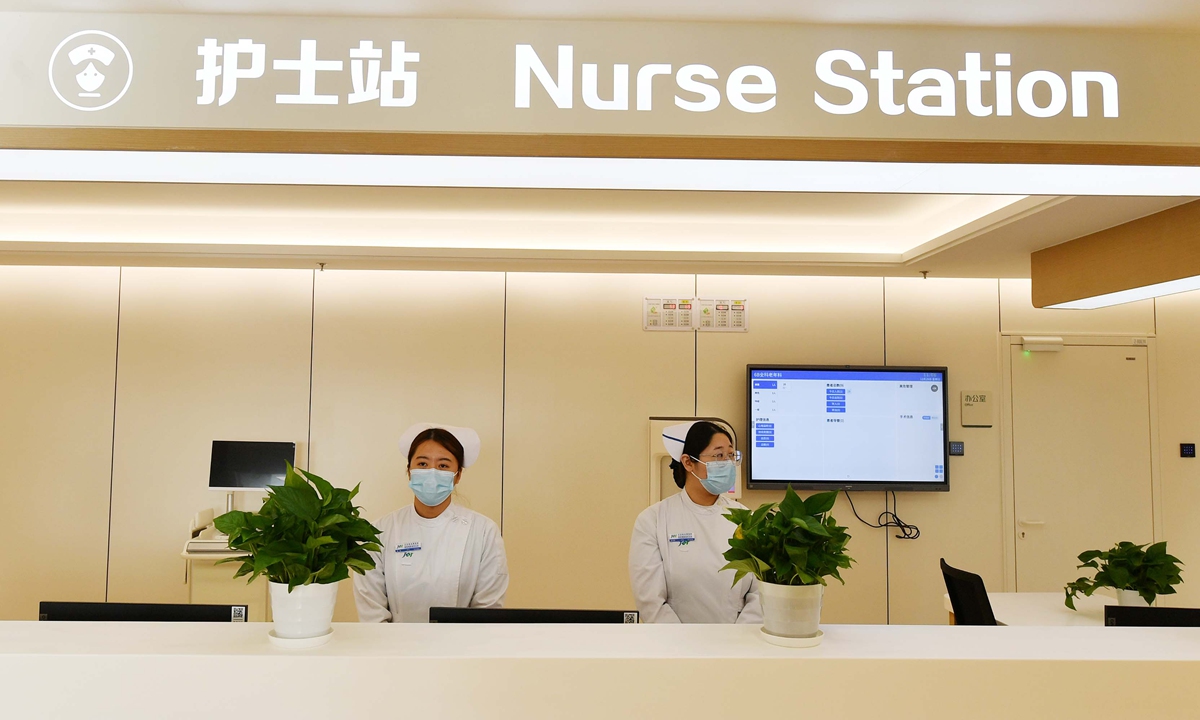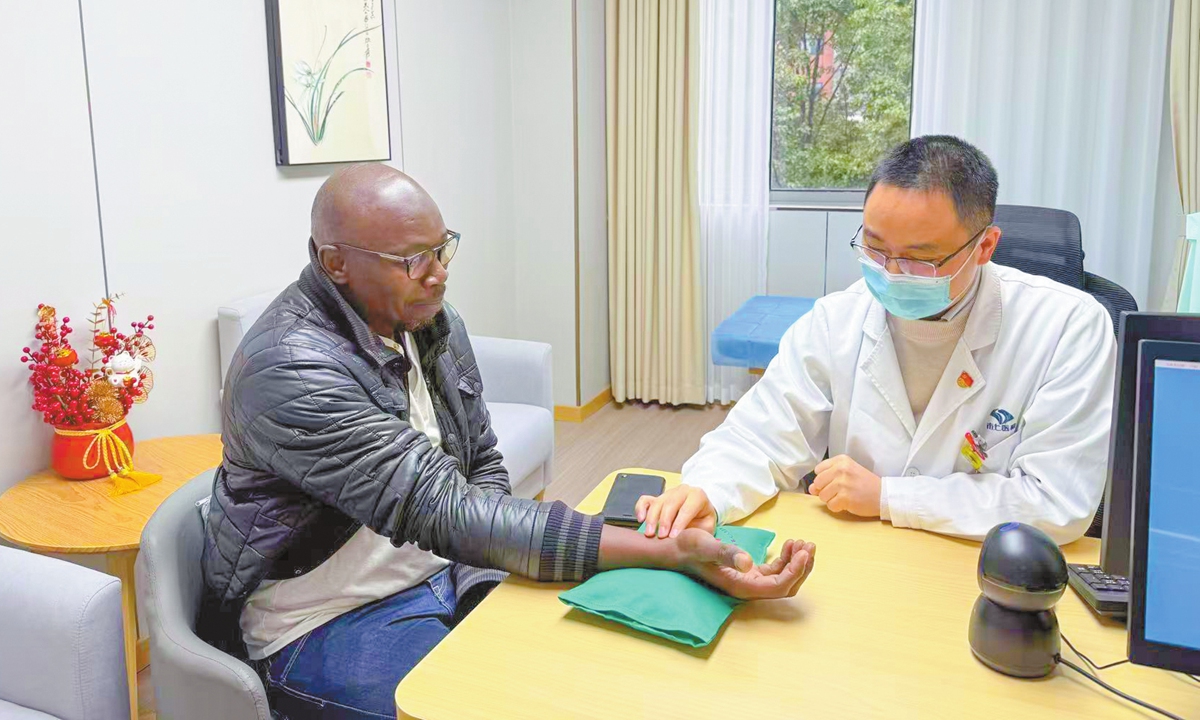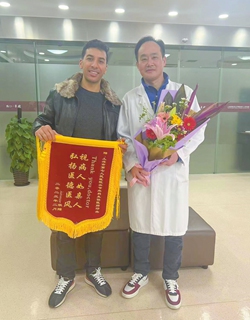
 i_need_contribute
i_need_contribute
Amid the "China Travel" trend, the number of foreigners coming to China continues to grow. Many international visitors are now turning their attention to China's efficient and distinctive healthcare system. From its advanced modern medical services and the global appeal of traditional Chinese medicine to the growing popularity of medical tourism, "China Hospital" has become a buzzword online, serving as a new option for many foreign patients.
In light of this, the Global Times is launching a three-part series of "Healing in China," which will explore the various aspects of how the country's healthcare system is attracting patients from around the world and gradually transforming into a popular global destination for medical services. This is the first installment in the series.

Nurses work at the nurse station at the Jishuitan Hospital Huilongguan Branch in Beijing on December 29, 2024. Photo: VCG
Standing at the entrance of a hospital in Shanghai, 17-year-old Jack and his mother Beatrix felt a mix of anxiety and hope.
After moving from their hometown in Germany to Shanghai months ago, Jack's vitiligo had flared up again. Medication had proven little effective at that time, and he even experienced side effects like diarrhea. Following a recommendation from their insurance company, Beatrix brought Jack to the International Medical Department (IMD) of Shanghai Seventh People's Hospital.
Before this, they had few experience with public hospitals in China, and knew very little about the country's healthcare system. As Beatrix looked at her son, who was frowning in discomfort, a wave of worries once washed over her. Would the hospital's procedures be complicated? Was its medical standard good enough? Would they struggle to communicate due to the language barrier?
Their concerns began to dispel when they were standing at the bright and spacious waiting area of the hospital, where the professionalism of the staff and their fluent English put them at ease. Under the attentive care of the dermatology specialists at the hospital, Jack's vitiligo symptoms greatly improved, and his overall health was getting better and better.
"This has been a very satisfying experience," Beatrix told the Global Times. "The level of expertise, the quality of service, and the overall arrangement of the medical process, have all left us with a great impression on the hospital."
The experience of Jack and Beatrix is not isolated. A recent report by the Xinhua New Agency highlighted the story of Van Vithyea, the Consul General of Cambodia in Southwest China's Chongqing Municipality, who praised China's healthcare system after his twin daughters were born in a Chinese public hospital.
"China's healthcare system has made remarkable strides in recent years," he said, adding that the system has combined "modern medical advances and traditional practices to deliver accessible, affordable, and high-quality care to its population, and for those who seek quality medical treatment from around the world."
During this process, major Chinese cities have been enhancing facilities and devices in medical institutions, improving policies to facilitate foreign patients' access to healthcare and share in the benefits of China's development.
Recalling taking her son to Chinese hospital a few months ago, Beatrix described it as "everything went smoothly." From registration, pre-consultation, to seeing the doctor, picking up medication, and receiving guidance on its use, the entire process was seamless, she said.
Beatrix spoke highly of the professionalism of the medical staff in the hospital. "The doctor was very thorough in his examination, taking the time to understand Jack's past treatment history and recent reactions, before formulating a treatment plan that combined Western and traditional Chinese medicine," Beatrix said. Through the communication with the doctor, she felt that he had a deep understanding of vitiligo treatment and was particularly patient.
Previously in Germany, Jack's treatment primarily relied on hormones or immunomodulatory drugs, which had noticeable side effects, said Beatrix. "But here in Shanghai, the combined treatment of Western and traditional Chinese medicine - something that we have rarely encountered outside of China - reduced side effects and gradually improved Jack's overall health. That's truly wonderful," Beatrix told the Global Times.
The Shanghai Seventh People's Hospital opened its IMD in May 2024, primarily serving foreign patients in Shanghai. Located just 5 kilometers from the Shanghai Free Trade Zone (FTZ), and not far from the estuary of the Yangtze River into the East China Sea, the department has treated many international patients working in companies within the FTZ, as well as foreign crew members who experience sudden illnesses or injuries in the East China Sea, Wang told the Global Times.
Earlier this year, for instance, the department treated a Filipino crew member who suffered multiple fractures and soft tissue injuries after an accidental fall into the water. Its Orthopedic specialists quickly performed surgery on the patient. However, the unexpected incident had left the crew member struggling with post-traumatic stress disorder (PTSD).
During that time, the IMD's medical team communicated with him multiple times in fluent English, providing detailed care to help alleviate his anxiety. After seven days of treatment, both physical and mental health of the patient greatly improved, and he later flied home smoothly, Wang recalled.
"The way you always had a smile on your face, even when the workload was heavy, really inspired me. Your positive energy and professionalism were truly admirable," read a thank-you letter that the crew member wrote before leaving hospital. "You made a difficult time a little easier with your kindness [and] compassion."
In the eyes of some foreign patients, Chinese hospitals that they visited have many advantages compared to those out of the country.
Nigerian Andrew visited the IMD of Shanghai Seventh People's Hospital in January, due to a back injury from playing soccer. He said that in hospitals outside of China, it can sometimes take several days or even weeks to get an appointment with a specialist. "But at this hospital in Shanghai, I completed the entire process of registration, consultation, and treatment in one day," he told the Global Times. "For someone like me with acute symptoms, receiving treatment promptly is absolutely important."
Allen, a Kenyan resident in China for nine years, praised the affordability of Chinese public medical care.
He experienced the country's healthcare system firsthand when he collapsed and was rushed to Beijing's Chaoyang Hospital. Panicked about costs after hearing of $3,000 ambulance rides in the US, he was relieved to learn the ride cost just 120 yuan ($17).

A Nigerian patient sees a doctor at Shanghai Seventh People's Hospital in January 2025. Photo: Courtesy of Shanghai Seventh People's Hospital
At the emergency department, prompt treatment and tests were far cheaper than expected. "It was a great relief," Allen said, noting the staff's patience with non-Chinese speakers, often aided by English-speaking colleagues.
What stood out was the holistic approach. Unlike the aggressive antibiotic prescriptions Allen knew from Kenya, Chinese doctors prioritized lifestyle and dietary advice, complemented by traditional Chinese medicine to minimize side effects.
Meanwhile, booking a specialist was seamless via an automated system, a stark contrast to months-long waits in systems like the UK's NHS. Allen also valued the choice between efficient public hospitals and pricier private ones, noting that quality remains high regardless. "The system works to alleviate worry," he said, reflecting on how China's healthcare excellence, experienced by friends like one who overcame infertility, counters misconceptions abroad.
Of course, language is often a challenge for foreign patients. "It's best to have someone with you who understands Chinese and is familiar with how Chinese hospitals work," Allen said.
Beatrix, Jack's mother, was most impressed by the "human touch" of Chinese doctors. She said that in hospitals abroad, communication between doctors and patients is often limited, and very few doctors take the initiative to help patients coordinate follow-up appointments.
"But here in China, the hospital team proactively arranged Jack's follow-up visits during his free time after class, and that minimized the impact on his studies," Beatrix told the Global Times. "This was incredibly considerate, really touched me."
Moreover, China's advanced medical capabilities have earned international acclaim, drawing patients worldwide for complex conditions.
For instance, in October 2024, CCTV News reported that a British patient received swift cardia cancer surgery and radiotherapy in Shanghai, surpassing UK timelines. A 13-year-old Russian girl, underwent eye-preserving surgery for retinoblastoma, avoiding enucleation proposed elsewhere.
A two-year-old Swedish toddler, halted neurological decline through gene-modified stem cell therapy for metachromatic leukodystrophy (MLD) in Guangzhou, according to Guangzhou Daily. Costing only 88,000 yuan, the treatment halted her neurological decline, improving her eye function and cognition. "We'd asked doctors from all over the world," her father told media emotionally, saying that China opened the gate of hope to the family.
As more foreigners seek medical care in China, hospitals and local governments in these major cities like Beijing and Shanghai are stepping up efforts to improve services, fine-tune policies and management, and enhance convenience for international patients.
As early as 2020, Shanghai launched a pilot program for international medical tourism, selecting 10 institutions - including joint-venture and foreign-funded private hospitals - as pilot sites, along with 10 "seed institutions" to foster development in the sector. In September 2023, the program expanded to include high-level public hospitals, which are home to world's top-tier medical technologies.
In the first quarter of 2024, these 13 pilot hospitals recorded 133,900 outpatient and emergency visits from international patients, marking a year-on-year increase of 31 percent, local government reported.
Luo Li, director of the Shanghai Research Center for Governance of Emerging Medical and Public Health Technologies, said that at least 12 specialties in Shanghai have reached world-class clinical levels, making them fully capable of providing top-tier medical services to patients in need, according to CCTV News.

An Algerian patient presents a commendatory banner to his Chinese doctor to express his gratitude in Feburary 2024. Photo: Courtesy of Shanghai Seventh People's Hospital
This, he noted, demonstrates not only the quality of Shanghai's medical services, but also the city's unique cultural appeal - injecting fresh vitality into the local economy.
In addition, China is actively opening its doors to high-quality international medical resources. Jiao Yahui, director of the Medical Administration Department under the National Health Commission, said at a press conference hosted by the State Council Information Office on April 21 that significant progress has been made since the launch of the comprehensive pilot program for the expansion of the service sector.
The country has encouraged the development of foreign-funded medical institutions and introduced overseas medical professionals. Currently, there are over 150 joint-venture or wholly foreign-owned medical institutions across the country, along with more than 1,500 short-term practicing overseas medical professionals, according to Jiao.